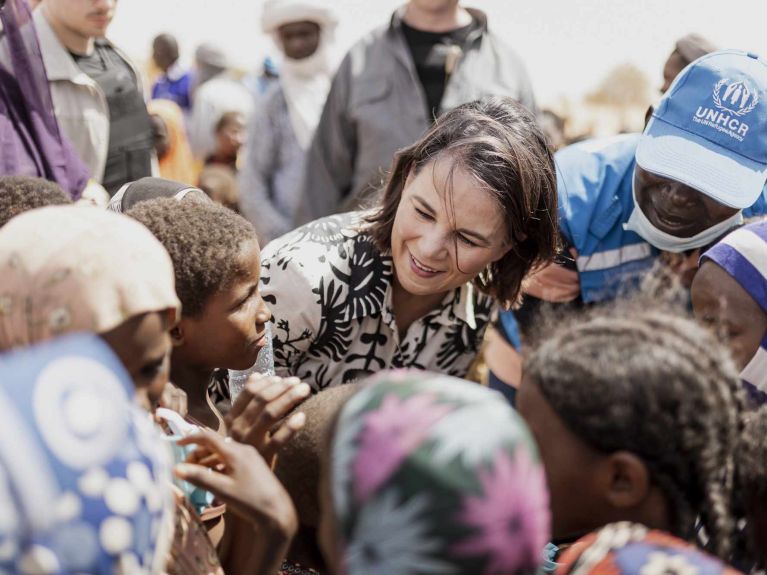Germany’s Ministry of Foreign Affairs has outlined specific principles guiding its approach to forced migration and asylum. Here is a summary of Germany’s foreign policy framework concerning refugees:
**1. Crisis Prevention and Conflict Resolution:**
Germany aims to tackle the root causes of forced migration by preventing crises before they erupt. This includes supporting police reforms in Nigeria and democratic elections in African states to promote stability and governance. Participation in peace missions and implementing crisis prevention projects are key strategies.
**2. Defusing Ongoing Crises:**
When conflicts arise, Germany engages in de-escalation efforts both bilaterally and through European and multilateral platforms. Stabilization projects in regions like the Lake Chad Basin aim to restore peace, ensure basic healthcare, and rebuild infrastructure, thereby creating conditions for displaced individuals to stay in or return to their homes safely.
“Refugees in Germany face significant psychological distress due to pre-migration trauma, post-migration stressors, and prolonged asylum processes, which can lead to high levels of anxiety, depression, and post-traumatic stress disorder (PTSD).”
Georgiadou, E., Zbidat, A., Schmitt, G. M., & Erim, Y. (2018). Prevalence of mental distress among Syrian refugees with residence permission in Germany
**3. Providing Humanitarian Assistance:**
Germany is a major global donor of humanitarian aid, offering emergency accommodation, food, healthcare, and education in crisis-hit regions. The country collaborates with UN agencies like the UNHCR and WFP, as well as various NGOs, to alleviate the suffering of displaced individuals due to conflicts, climate change, or natural disasters.
**4. Supporting Maritime Rescue:**
The Federal Foreign Office is committed to promoting civilian maritime rescue operations. From 2024 to 2026, Germany has allocated two million euros annually to support these efforts both at sea and on land.
**5. Shaping a European Response:**
Germany works closely with European partners to develop a cohesive and humane approach to managing the refugee and migration situation. This involves protecting the EU’s external borders and forming sustainable partnerships with key countries of origin and transit. Germany also plays a significant role in the EU Resettlement Programme.
“The integration of refugees into the German labor market is hampered by numerous barriers, including language difficulties, discrimination, and lack of recognition of qualifications, which contribute to economic hardship and social exclusion.”
Brücker, H., Rother, N., & Schupp, J. (2016). IAB-BAMF-SOEP Survey of Refugees: Overview and First Results. *Institute for Employment Research (IAB) – Federal Office for Migration and Refugees (BAMF) – Socio-Economic Panel (SOEP) Study
**6. International Cooperation and Advocacy:**
Germany champions a fair distribution of responsibilities at the international level to manage and prevent large-scale refugee situations. It actively supports the implementation of the United Nations Global Compact on Refugees (GCR) and the Global Compact for Safe, Orderly and Regular Migration (GCM).
**7. Informing and Educating:**
To combat misinformation and provide accurate information about migration, the Federal Foreign Office utilizes both local and digital channels. Information projects in countries of origin and transit help potential migrants make informed decisions about their journeys.
**8. Enhancing Refugee Protection:**
Germany emphasizes the importance of protecting those in need. The country provides support to nations hosting large numbers of refugees and ensures that refugees have access to opportunities for education and integration through initiatives like the Albert Einstein German Academic Refugee Initiative (DAFI).
**9. Promoting Voluntary Return and Reintegration:**
Germany supports migrants who cannot remain legally in third countries by facilitating their voluntary return to their regions of origin. This approach includes providing assistance for their reintegration into their home communities.
While several crises such as the Ukraine-Russia conflict, the Israel-Palestine war, the Taliban’s rise to power in Afghanistan, the ongoing unrest in Syria and Iraq, and confrontations involving Iran’s proxy groups in the region have intensified, it appears that Germany faces significant challenges in two major areas of its foreign policy: crisis prevention and crisis mitigation. Despite its comprehensive policies, the increasing number of global crises suggests potential inefficiencies and a need for more proactive and effective measures in these critical areas.




